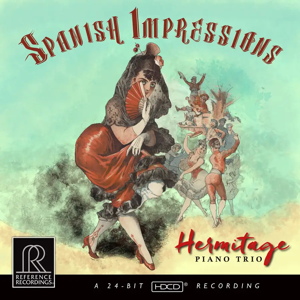
Spanish Impressions
Enrique Arbós (1863-1939)
Tres Piezas Originales en Estilo Español, op. 1 (1886)
Joaquín Turina (1882-1949)
Piano Trio No. 2 in b minor, op. 76 (1933)
Gaspar Cassadó (1897-1966)
Piano Trio in C major (1926)
Mariano Perelló (1886-1960)
Tres Impresiones (1922)
Hermitage Piano Trio
rec. 2023, Skywalker Sound, Marin County, CA, USA
24-bit HDCD recording
Reference Recordings RR151 [69]
This is a most interesting program, comprising four late Romantic Spanish piano trios, none well-known, with a good deal in common stylistically but with sufficient differences to avoid any sense of repetition. The two works most influenced by Spanish dance rhythms are placed first and last, separated by the two more formally constructed trios.
The inspiration for Enrique Arbós in his first published work is made very clear by the names of the three movements: Bolero, Habanera and Seguidillas Gitanas. It is a substantial piece at over eighteen minutes, and is good enough to make one wish that his significant career as a conductor had not got in the road of his composing. The slow and sultry Habanera is particularly effective. There are a few other recordings, but the main competition comes from the Devich Trio on Challenge Classics (review). The Hermitage reading is quicker in all three movements, more than half a minute so in each of the longer second and third movements. This quicker tempo works well in the Gitanas, but less so in the Habanera, so I am inclined to call it a draw.
Turina is the best-known and most recorded of the composers here. My colleague Gary Higginson commented in a 2023 review of all Turina’s piano trios on IBS (review) that Turina’s music deserved to be better known outside his native Spain, a statement with which I heartily concur. His second trio is the least Spanish of the four works on the disc under review, and it is also the best. It is more broadly European, though certainly with an underlying Spanish inflection. The IBS disc is in my to-be-reviewed queue, and I listened to this trio as part of writing this current review. That performance, by pianist Patricia Arauzo and brothers David and Aldo Mata, is superior to that by the Hermitage Piano Trio. There is much more drama, passion and character in the IBS recording, and I look forward to listening to their other performances. That said, I also listened to the versions by the Lincoln Trio (Cedille – review) and Trio Arbos (Naxos – review), and preferred the Hermitage to both.
Gaspar Cassadó was one of the great cello soloists of the 20th century, and this trio is one of the earlier of his not inconsiderable number of compositions (at least 58 and more than 90 transcriptions). The booklet notes inform me that it is “imbued with Spanish and Catalan melodies and rhythms”, though I also heard hints of Ravel’s incomparable Trio, which Cassadó would have certainly known very well. Cassadó writes well for all three instruments, which is not always the case with a soloist expanding to other instruments. It is not as impressive as the Turina, lacking melodic inspiration at times, relying more on dramatic outbursts. While the performance here is good, again it is not as good as the competition, in this case, the remarkably dynamic and intense reading by the Devich Trio.
I had not encountered the music of Mariano Perelló before, and for a very good reason, it would seem. When I consulted the Allmusic database, it appears that this recording is the only one of any of his music in the catalogue, though the booklet makes no claims about this being a first recording. He was a renowned violinist and a member of the prominent ensemble Trio Barcelona. While his Tres Impresiones do not specifically reference Spanish dances, they are there throughout. Each movement begins impressively, indeed more so than the Arbós, but in each case, Perelló struggles to sustain that level of quality. This is especially so in the last Gypsy-inspired movement which does become a little repetitive.
The Hermitage Piano Trio is based in the United States, and has been together for more than ten years. This is only their second recording, the first, also on Reference Recordings, an all-Rachmaninov disc (review). This is my first encounter with them, and while I am generally positive about their playing, I don’t think that their performances displace the best.
In his review of the Rachmaninov trios, our reviewer praised the booklet notes, saying that he had “rarely read such comprehensive and detailed essays”. I can second that – the notes here, again written by recording producers Victor and Marina Ledin, are quite exceptional. Mariano Perelló is quite evidently a little-known composer, yet the biographical notes for him run to four pages. The recording is a HDCD one, which is a patented system for recording in 24-bit and then converting that to the standard 16-bit format of a normal CD, but with the extra “detail” somehow incorporated. That is as maybe: the recording didn’t sound any better than hundreds of others I have, and indeed the IBS disc of Turina’s trios sounded much better.
These are good performances, and if you don’t know the Turina and Cassadó trios, the disc won’t disappoint. For piano trio aficionados, the Perelló work becomes the main reason to purchase the disc, and I’m not convinced it is a strong enough work to do so.
David Barker
Help us financially by purchasing from




















